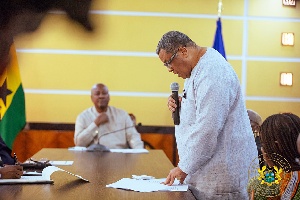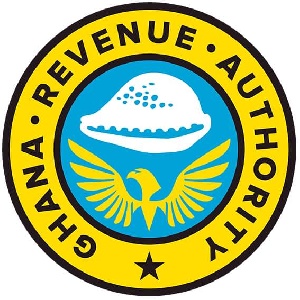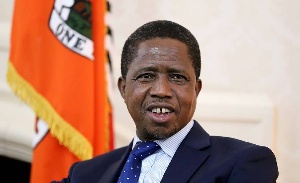- Home - News
- Elections 2024
- News Archive
- Crime & Punishment
- Politics
- Regional
- Editorial
- Health
- Ghanaians Abroad
- Tabloid
- Africa
- Religion
- Photo Archives
- Press Release
General News of Wednesday, 7 May 2025
Source: www.ghanawebbers.com
Goosie outlines 3 fundamental pillars of Export Development Programme
Mr. Goosie Tanoh Speaks on Export Development
Mr. Goosie Tanoh is the Presidential Advisor for the 24-Hour Economy. He recently discussed the Government's Accelerated Export Development Programme (AEDP). This program has three main pillars: Production Transformation, Market Systems Efficiency, and Human Capital Development.
He spoke during the inauguration of a 19-member Advisory Committee. This committee is chaired by President John Dramani Mahama and was inaugurated at the Presidency in Accra.
Mr. Tanoh explained that Production Transformation aims to reduce Ghana's reliance on raw commodity exports. Instead, it focuses on exporting value-added products. He emphasized that improving Supply Chain and Market Efficiency will lower logistics costs for producers.
Additionally, he mentioned plans to develop a skilled workforce. This workforce will be digitally fluent and globally competitive.
The Committee's inauguration fulfills President Mahama’s campaign promise for 2024. He pledged to work with industry leaders to eliminate barriers in Ghana’s export sector. The goal is to make Made-in-Ghana goods popular across Africa and internationally.
This initiative aligns with his 24-Hour Economy plan, which aims to boost economic growth and create jobs. Mr. Tanoh stated that overcoming the economic crisis requires supporting local producers in expanding their production and exports.
Despite efforts over decades, non-traditional exporters earn only $3.5 billion annually. Mr. Tanoh noted this amount is disappointing given Ghana's potential as an economy.
Most export earnings still come from cocoa beans, gold, and crude oil with little added value. He believes this reliance contributes to ongoing economic challenges.
To address these issues, Mr. Tanoh stressed the need for self-reliance in export industries. He stated that assisting industries in expanding and diversifying exports is crucial.
The President’s programs aim for structural transformation alongside improved governance and macroeconomic management. The vision includes creating a resilient economy that benefits all citizens, especially vulnerable groups.
Mr. Tanoh acknowledged existing challenges but insisted they are not insurmountable obstacles. He highlighted regulatory hurdles faced by exporters who must navigate up to 16 steps for pre-export documentation.
Delays at ports often involve informal payments and high costs as well. Additionally, there is a lack of accredited laboratories for compliance documentation.
He remarked that these issues discourage many Ghanaian firms from exporting their products.
Regarding regional opportunities, Mr. Tanoh pointed out Ghana's role as home to the AfCFTA Secretariat can enhance its export potential significantly.
With investments in diversified production and quality adherence, he believes Ghana can become a central hub for production and exports in West Africa.
President Mahama’s establishment of this Advisory Committee signals a shift towards collaboration with industry leaders rather than bureaucracy alone.











